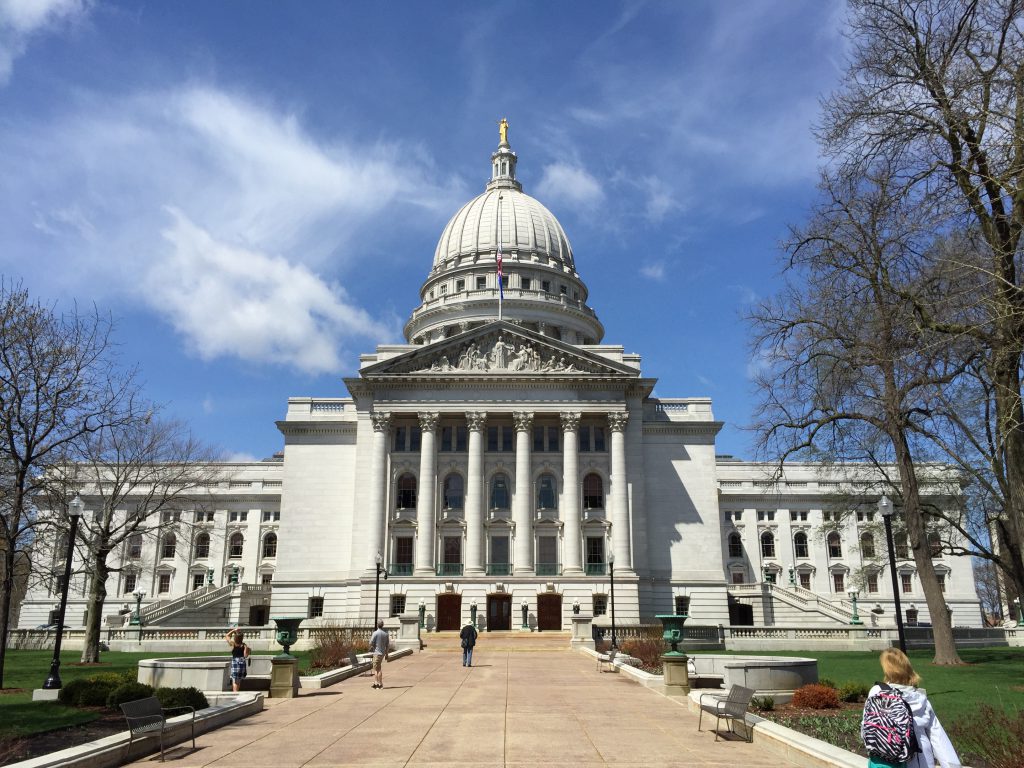Evers, Senate Agree on Pandemic Bill
Bipartisan bill goes back to Assembly, where leader says GOP will resist compromise.
With a surprise last-minute deal, the state Senate passed its slimmed-down legislation responding to the COVID-19 pandemic with only two dissenting votes Tuesday, teeing it up for the Assembly to pass and Gov. Tony Evers to sign.
The bill won Evers’ support after an amendment was added that narrowed the centerpiece of the bill — language shielding institutions from liability for COVID-19 related illnesses or deaths. To win the governor’s support, legislators removed language that would have blocked lawsuits even against organizations that flouted health orders.
The governor indicated Tuesday afternoon that he would sign the bill if the Assembly concurs with the Senate version, and singled out the Republicans’ new Senate majority leader, Devin LeMahieu (R-Oostberg), for “a good faith effort in compromise and bipartisanship.” Senate Republicans, in a joint statement, took credit for bipartisanship and for presenting “the unified governance our state needs right now.”
Assembly Republicans, however, don’t appear to be ready to join the festivities. Assembly Majority Leader Jim Steineke (R-Kaukauna) signaled that the chamber’s GOP caucus plans to continue pushing for several controversial provisions that the Senate stripped from the Assembly version — and suggested that the Assembly wouldn’t take up the revised legislation again until later in the month.
Focus on immunity
The bill’s liability immunity provision was a central part of both the Assembly and Senate versions of the bill.
The language protects businesses, nonprofits, colleges and universities as well as Indian tribes from being sued if they are accused of causing or contributing to death, injuries or damages due to COVID-19. The immunity would not apply if the institution’s action — or failure to act — “involves reckless or wanton conduct or intentional misconduct.”
Until Tuesday, however, the bill extended that lawsuit protection even if an organization ignored federal, state or local health orders to close or limit the size of gatherings. Failure to comply with such orders “does not constitute reckless or wanton conduct or intentional misconduct,” according to the bill that passed the Assembly last week. The same language (which was later removed) was included in the version of the legislation that passed out of the Senate Organization Committee on a 3-2 party-line vote on Monday.
Groups critical of the liability shield singled out that sweeping immunity as particularly egregious. In a joint statement issued Tuesday morning — before the Senate compromise emerged — organizations representing small business and plaintiffs’ lawyers, as well as the Pabst Theater Group in Milwaukee, condemned the legislation.
But three hours into the full Senate’s floor session on Tuesday — after breaks for caucus meetings by both parties — Republican Senate leaders offered a five-page amendment that eliminated the protection for organizations that disregard health orders.
The amendment also narrowed another part of the original liability shield language that applied to health care providers. The original version granted providers immunity generally from lawsuits related to health care provided during the COVID-19 pandemic public health emergency. The change limits that immunity only to COVID-19-related health care.
Swift passage
LeMahieu summarized the changes briefly for the lawmakers, who accepted the new amendment on a 29-2 vote, then passed the Senate version on a 29-2 vote as well without discussion.
The legislation as it passed also includes a provision requiring nursing homes and assisted living facilities to allow at least one “essential visitor” per resident, although the long-term care facilities can also reject visitors who violate safety precautions.
Most of the rest of the Senate version matches up with provisions that Evers had urged the Legislature to adopt in late December and again last week — items that the governor has said he as well as Republican leaders in both the Assembly and the Senate all support. Many of them are extensions of earlier measures in the previous state COVID relief bill that lawmakers passed and Evers signed in April 2020.
“We need to expand access to health care, support our medical professionals, ensure certainty and safety to our schools, and provide relief to small businesses,” Larson stated. “Instead, we’re offering immunity to bad actors who don’t take the pandemic seriously enough, and forcing skilled nursing facilities to accept visitors when their populations are among the most vulnerable to this virus.”
The other “no” vote came from Sen. Steve Nass (R-Whitewater), who had declared Monday he would reject the bill because it did not rein in public health officials and did not penalize school districts for holding classes virtually instead of in person.
Other lawmakers who voted for the bill issued statements in which they acknowledged its passage but also insisted more would have to be done — while viewing what that necessary “more” was through opposing lenses.
In their joint statement, Senate Republicans burnished their legislation.
“This is the unified governance our state needs right now. It’s refreshing to start off the year and legislative session with a comprehensive, bipartisan plan we can confidently share with constituents as we continue to combat COVID-19 and safely re-open our state. We look forward to the Governor signing the bill as soon as it reaches his desk.”
Divided divided government?
Evers’ statement, hours before he was to deliver his 2021 State of the State Message, shared the buoyancy of the Senate GOP.
“I’ve been grateful to work together with Republican Majority Leader LeMahieu to find common ground and pass a bill on COVID-19 that reflects a good faith effort in compromise and bipartisanship,” Evers stated.
“Although it’s not the COVID compromise we originally proposed, AB 1 as amended by the Senate is a good start to support our state’s response to this pandemic. The Assembly should pass AB 1 as it was amended today and send it to my desk for my signature without delay.”
“I am incredibly disappointed that today, the state Senate passed a bill that fails to address so many of the issues we’re hearing from constituents from all over the state,” Steineke stated.
Among the Assembly provisions that the Senate dropped, Steineke’s statement referred to language that would have blocked local health officers from closing places of worship or from closing businesses — both to prevent the spread of disease. Another item left out of the Senate version would have blocked employers from requiring employees to get a vaccine for COVID-19.
Those and other parts of the Assembly version have been criticized for weakening public health protections.
“We will continue to advocate for the priorities of our constituents over the next few weeks as we move towards a response to the Senate’s actions during our next floor period later this month,” Steineke said.
The Assembly’s next floor period isn’t scheduled for two weeks: Jan. 26 through Jan. 28
Reprinted with permission of Wisconsin Examiner.
More about the Coronavirus Pandemic
- Governors Tony Evers, JB Pritzker, Tim Walz, and Gretchen Whitmer Issue a Joint Statement Concerning Reports that Donald Trump Gave Russian Dictator Putin American COVID-19 Supplies - Gov. Tony Evers - Oct 11th, 2024
- MHD Release: Milwaukee Health Department Launches COVID-19 Wastewater Testing Dashboard - City of Milwaukee Health Department - Jan 23rd, 2024
- Milwaukee County Announces New Policies Related to COVID-19 Pandemic - County Executive David Crowley - May 9th, 2023
- DHS Details End of Emergency COVID-19 Response - Wisconsin Department of Health Services - Apr 26th, 2023
- Milwaukee Health Department Announces Upcoming Changes to COVID-19 Services - City of Milwaukee Health Department - Mar 17th, 2023
- Fitzgerald Applauds Passage of COVID-19 Origin Act - U.S. Rep. Scott Fitzgerald - Mar 10th, 2023
- DHS Expands Free COVID-19 Testing Program - Wisconsin Department of Health Services - Feb 10th, 2023
- MKE County: COVID-19 Hospitalizations Rising - Graham Kilmer - Jan 16th, 2023
- Not Enough Getting Bivalent Booster Shots, State Health Officials Warn - Gaby Vinick - Dec 26th, 2022
- Nearly All Wisconsinites Age 6 Months and Older Now Eligible for Updated COVID-19 Vaccine - Wisconsin Department of Health Services - Dec 15th, 2022
Read more about Coronavirus Pandemic here























